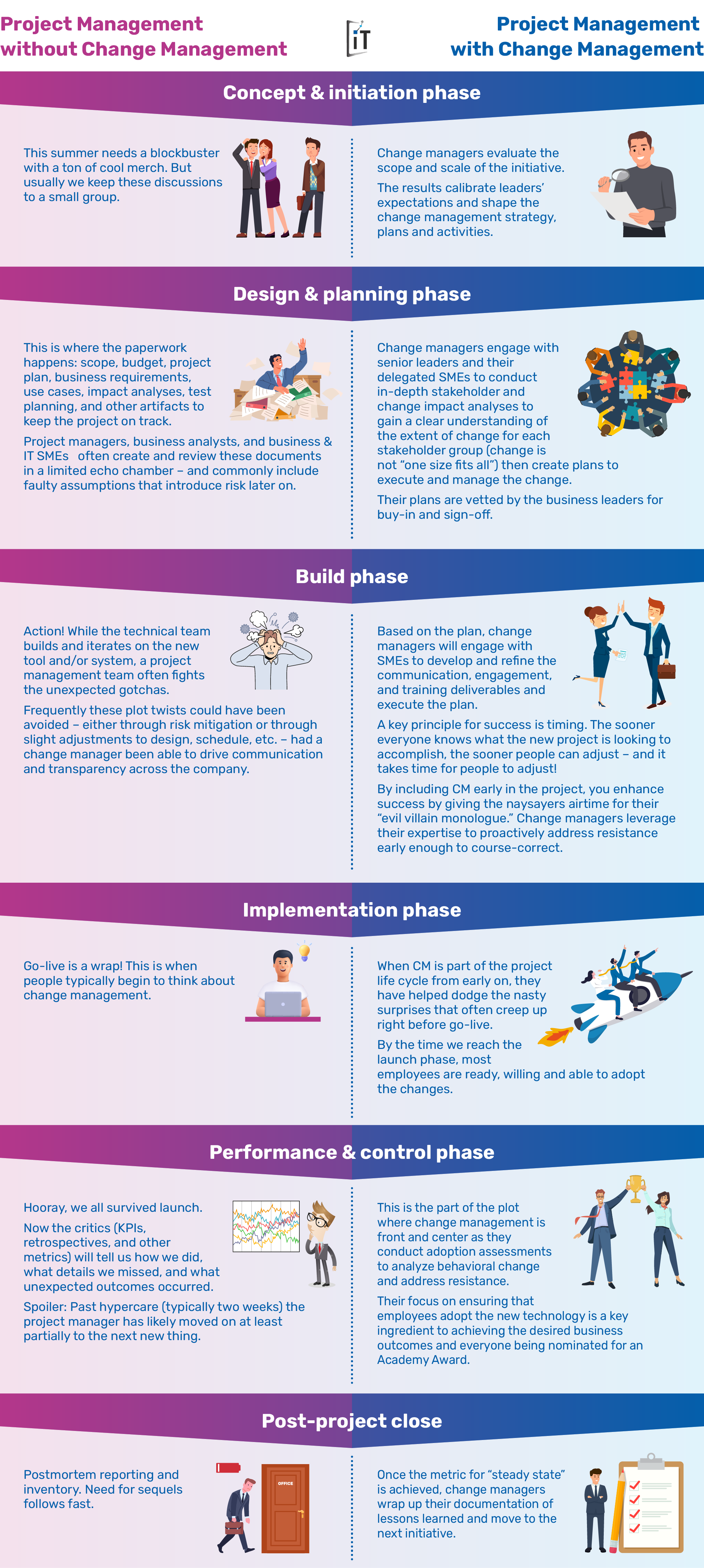Change management for project managers: how to ensure better outcomes

There is no magic wand moment in enterprise project management. This is okay; we don’t live in a campy 80s/90s teen comedy movie. (On the plus side, all the money we save on Aqua Net and unfortunate eye makeup means we can buy nicer cell phones!)
We project managers also need to make sure [insert shiny new project] engages the audience longer than the runtime of a typical movie. But the pressure to create instant gratification frequently creates a comedy of errors, except it drags on for years and the only ones laughing are the employees’ therapists.
Change management can help ensure a better outcome – but it needs to play a starring role commencing at the opening scene, rather than deployed as a deus ex machina swooping in at the end.
With technology implementations (minus proper change management), the disaster, the plot twist, and the fight to the death aren’t evenly spaced out like in the movies. Instead, the nasty little surprises all seem to come a week or two before launch, each spurning a series of disasters and fights to the death. Go-live is at risk; status reports are red; and you’re gobbling a popcorn bucketful of Tums and questioning all your life choices.
In the tech universe, go-live isn’t some happy movie denouement where the hero gets the girl/guy/whatever. Enterprise projects have way more twists, disasters, and epic battles.
Six months later, the powers that be will find out that the new tool/system is held together by bubble gum and paperclips because the organization was reactive instead of strategic – likely in more places than this implementation.
Thus begins the hunt for a shiny new hero/PM and new solution to save the day.
This gets expensive. And bad for morale.
Bringing in a project manager to fix things after the apocalypse is a robust industry, even though most of the issues that need to be fixed could have been avoided with proper change management.
If you want fast results that last, change management needs to be front and center in the first scene. With enterprise technology upgrades, you need the jock, the stoner, and the geek doing their dance montage together shortly after the opening scene; their implausible yet endearing alliance can’t wait until the third act. Sorry, John Hughes, but you never had to answer to 21st-century corporate American stakeholders.
Below is a comparison table of project management with change management versus without change management.

Of course this is a simplified path; we’ve glossed over the human and political factors at play.
There’s not really an archetype for PM in the movies – The Bobs from Office Space and Heather Mooney (Romy & Michele’s High School Reunion) are probably the closest we have.
Fortunately, Tobi Walters (Romy & Michele) grew up to be the change management practitioner. She ties together all the loose ends we PMs aren’t geared to notice, so that everybody has a fun high school reunion. (Except Christy Masters – she sucks).
Ready to add some change management mojo to your project management practice? Contact our project management heroes at pmo@italentdigital.com and put our expertise to work on your most pressing projects! Or visit our website to learn more about our outcomes-driven PMO capabilities or our Enteprise Change Management Practice.
Special thanks to Rachel Janssen and Sheila Kyle, who contributed significantly to this article.
You may also like:
How to use your PMO as a culture and enagement springboard
Why and how to add change management to your project management approach
PMO, CMO and TMO: what they are and how they drive change agility



